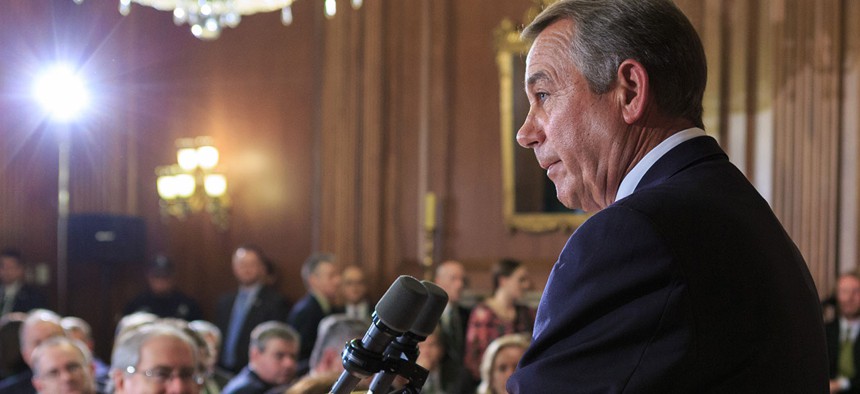
Office of the Speaker of the House
John Boehner's Attempt to Fix Things Before He Leaves Congress
He wants to "clean the barn up" before he leaves Congress. Here's what that could mean.
The most immediate consequence of John Boehner’s decision to resign as House speaker likely will be felt in federal offices throughout the country on Thursday morning: They will open as scheduled.
Before announcing his departure, Boehner had been under heavy pressure from conservatives to shut down the government if Democrats did not agree to defund Planned Parenthood. They’d even threatened to throw him out if he didn’t go along, using the possibility of a coup as a “sword of Damocles” over the speaker’s head. With Boehner’s decision to exit on his own, the House and Senate are expected to pass a stopgap bill on Wednesday to extend federal funding through December 11, avoiding a shutdown that would have begun at midnight.
This was, as Molly Ball wrote on Friday, John Boehner’s “last deal.” But it turns out he might not be done quite yet. The speaker won’t leave office for another month, and he has said he wants to “get as much finished as possible” before he goes. “I don't want to leave my successor a dirty barn,” Boehner said Sunday on CBS’sFace the Nation. “I want to clean the barn up a little bit before the next person gets there.”
So what does Boehner mean by cleaning up the barn?
Congress must confront a number of hot-button issues over the next several months, including raising the dreaded debt limit, refilling the Highway Trust Fund, and deciding whether to revive the Export-Import Bank, which lawmakers allowed to shutter earlier this year. Addressing all three of those problems will require bipartisan support, and Boehner’s lame-duck status gives him more room to negotiate with Democrats. On Tuesday, the speaker wouldn’t rule out passing a debt-limit bill in the next month, which he’d have to do over the opposition of a vast majority of House Republicans. And he has been trying for years, without much success, to get a longterm transportation infrastructure package through the House.
Democrats would eagerly welcome an activist speaker in his final weeks in office—they’ve been calling on him to sideline conservatives for months. And Boehner’s desire to give his successor, who is likely to be Majority Leader Kevin McCarthy, a fresh start could forestall, if not entirely prevent, the next round of tensions with the conservative hard-liners who forced Boehner out. But the politics are tricky, and conservatives are already warning prospective party leaders that if they want their support, they can’t just stand idly by and allow Boehner to go out in a bipartisan blaze of glory. One prominent Boehner foe on the right, Erick Erickson, even wants Republicans to go ahead with a motion to “vacate the chair” and throw Boehner out before October 30. “In short, John Boehner wants to give a big wet kiss to Barack Obama’s agenda on the way out the door when no one can hold him accountable,” Erickson wrote. For his part, Boehner said Tuesday that while there were “a number of issues” he wanted to deal with in the next month, he wouldn’t make any decisions that he wouldn’t have made before he decided to resign.
The tricky politics puts McCarthy in an awkward spot. He’s currently the second-ranking Republican in the House and the heavy favorite to replace Boehner as speaker, but he hasn’t locked up the votes yet. Appearing on Fox News on Monday evening, he distanced himself from parts of Boehner’s plan but not from others. McCarthy voiced support for action on a long-term highway bill, especially if it’s paired with tax reform, and he seemed open to raising the debt ceiling. But reiterated his opposition to the Ex-Im Bank, an 80-year-old federal lending agency that conservatives have opposed as an emblem of crony capitalism. “That has failed now, and it should stay failed,” McCarthy said. “I fought hard for that, and I’ll continue to fight.”
On Tuesday, Senate Majority Leader Mitch McConnell told reporters that he and Boehner would also begin discussion on a two-year budget compromise. The goal would be to have an agreement in place before the next government funding bill expires in December, but they may try to work even faster and strike a deal before Boehner leaves Congress.
Now, the likelihood that all of this gets done in the next month is close to nil. Congress’s eyes are often bigger than its stomach. Yet lawmakers always work best when there’s a deadline, and Boehner’s exit gives them one, circled in bright red. The speaker is leaving Congress without the career-defining achievement—a grand bargain on the deficit, for example, or immigration reform—that he long sought. But that doesn’t mean he intends to go quietly.






